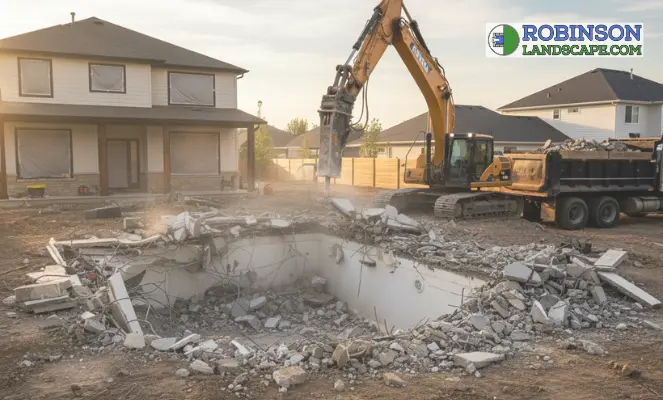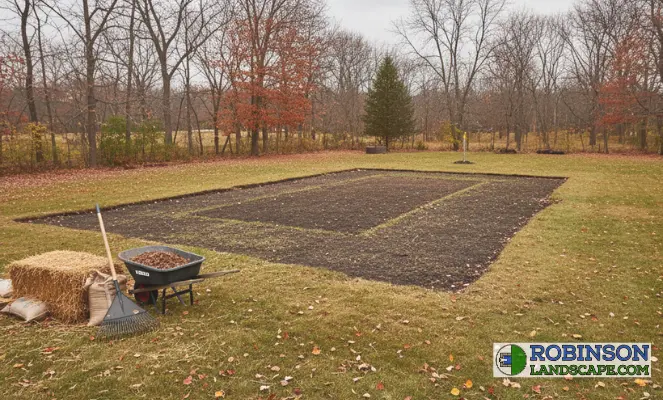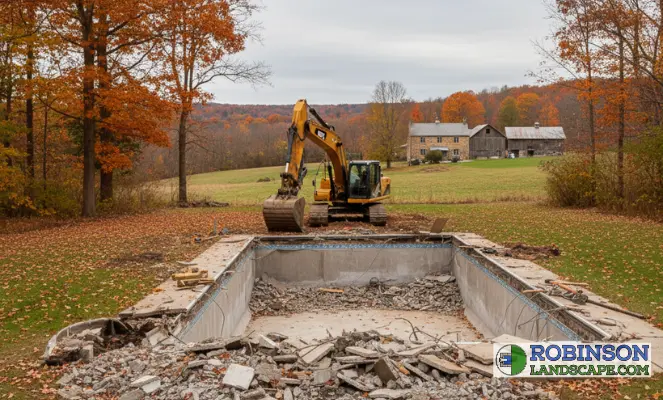When homeowners consider major backyard changes, removing an existing swimming pool might seem counterintuitive. However, the pool removal benefits extend far beyond simply reclaiming yard space. In today’s environmentally conscious world, eliminating your pool can significantly reduce your household’s ecological footprint while creating opportunities for more sustainable landscaping choices.
Many families installed pools during different times in their lives, but circumstances change. Children grow up, maintenance becomes overwhelming, or priorities shift toward more eco-friendly living. Rather than viewing pool removal as a loss, smart homeowners recognize it as an opportunity to create positive environmental impact right in their own backyard.
1. Substantial Water Conservation Impact
The most immediate environmental benefit of pool removal centers on water conservation. A typical residential swimming pool holds between 15,000 to 30,000 gallons of water, requiring constant refilling due to evaporation, splashing, and backwashing pool filters. During hot summer months, pools can lose up to 2 inches of water weekly through evaporation alone.
Consider the numbers: if your pool loses just 1,000 gallons monthly to evaporation and normal use, that equals 12,000 gallons annually. Multiply this by the millions of residential pools across the country, and the water consumption becomes staggering. By choosing pool removal, you’re eliminating this ongoing drain on local water resources.
Water conservation becomes even more critical during drought conditions when many municipalities implement water restrictions. Pool owners often face difficult choices between maintaining their pools and adhering to conservation guidelines. Removing your pool eliminates this dilemma entirely while demonstrating environmental responsibility to your community.
2. Dramatically Reduced Chemical Pollution
Pool maintenance requires substantial amounts of chlorine, algaecides, pH balancers, and other chemicals to maintain safe swimming conditions. These chemicals don’t simply disappear after use – they impact both immediate surroundings and broader ecosystems through various pathways.
When pools are drained for cleaning or winterization, chemical-laden water often enters storm drains, eventually reaching local waterways. Even trace amounts of pool chemicals can disrupt aquatic ecosystems, affecting everything from microscopic organisms to fish populations. Reduced maintenance through pool removal eliminates this source of chemical pollution entirely.
The manufacturing and transportation of pool chemicals also contributes to environmental degradation through industrial processes and carbon emissions. By removing your pool, you’re cutting demand for these products while reducing the associated environmental costs of their production and distribution.
3. Eliminating Energy-Intensive Operations
Swimming pools require significant energy for multiple systems operating throughout the swimming season. Pool pumps typically run 8-12 hours daily, while heaters consume even more energy to maintain comfortable water temperatures. Additional equipment like automatic cleaners, lighting systems, and water features add to the energy burden.
The environmental impact extends beyond your electric bill. Most electricity generation still relies heavily on fossil fuels, meaning your pool’s energy consumption contributes to carbon emissions and air pollution. Reduced maintenance achieved through pool removal can decrease your household’s energy consumption by 15-25%, depending on your pool’s size and equipment.
Pool removal also eliminates the need for energy-intensive manufacturing of replacement parts, equipment upgrades, and ongoing repairs that characterize pool ownership over time.
4. Creating Opportunities for Native Landscaping
Perhaps the most exciting environmental benefit of pool removal lies in backyard transformation possibilities. The space previously occupied by concrete and chemicals can become a thriving ecosystem that supports local wildlife and plant communities.
Native plant gardens require minimal irrigation once established, unlike pools that demand constant water input. These plants have evolved to thrive in local soil and climate conditions, making them naturally drought-resistant and low-maintenance. Native landscaping supports beneficial insects, birds, and other wildlife while improving local air quality through increased oxygen production.
Backyard transformation projects can incorporate rain gardens that capture and filter stormwater runoff, preventing pollution from reaching local waterways. Permeable surfaces like gravel paths or permeable pavers allow rainwater to soak into the ground rather than contributing to erosion and flooding issues common in heavily developed areas.
5. Reducing Urban Heat Island Effects
Concrete pool decks and surrounding hardscaping contribute to urban heat island effects, where developed areas become significantly warmer than surrounding natural landscapes. This phenomenon increases energy demand for air conditioning while creating uncomfortable outdoor conditions during hot weather.
Pool removal allows homeowners to replace heat-absorbing concrete with vegetation that naturally cools the surrounding area through evapotranspiration. Trees and shrubs provide shade while releasing moisture that cools the air, creating more comfortable outdoor living spaces without relying on energy-intensive cooling systems.
The cumulative effect of multiple pool removals within a neighborhood can measurably reduce local temperatures, benefiting the entire community while reducing overall energy consumption for cooling.
6. Supporting Sustainable Groundwater Management
Pools can interfere with natural groundwater patterns, particularly in areas with high water tables. The weight and impermeability of pool structures can redirect groundwater flow, potentially affecting neighboring properties and local ecosystems.
Pool removal restores natural drainage patterns while allowing rainwater to percolate into groundwater supplies rather than running off into storm systems. This water conservation benefit extends beyond simply eliminating pool water usage to actively supporting local water cycle health.
In drought-prone regions, every effort to support groundwater recharge becomes increasingly important for long-term community water security.
7. Long-Term Environmental Legacy
The environmental benefits of pool removal compound over time, creating lasting positive impacts that extend well beyond the initial decision. Reduced maintenance requirements mean fewer chemical purchases, less energy consumption, and minimal ongoing environmental impact year after year.
Backyard transformation projects mature into increasingly valuable wildlife habitats as plants establish deep root systems and create complex ecosystems. Native gardens often become more beautiful and environmentally beneficial with age, unlike pools that require constant intervention to remain functional and attractive.
Taking Action for Environmental Responsibility
Choosing pool removal represents a significant step toward reducing your household’s environmental footprint while creating new possibilities for sustainable outdoor living. The combination of water conservation, elimination of chemical pollution, reduced energy consumption, and opportunities for backyard transformation makes pool removal an environmentally sound investment in your property’s future.
Robinson Landscape specializes in environmentally responsible pool removal and sustainable landscaping solutions. Our team understands how to transform former pool areas into thriving, low-maintenance landscapes that support local ecosystems while enhancing your property’s beauty and value.
The pool removal benefits extend far beyond immediate environmental improvements to create lasting positive impacts for your family and community. Contact Robinson Landscape today to explore how pool removal can transform your backyard into an environmental asset that you’ll enjoy for years to come.

Tim Robinson is the owner of Robinson Landscape LLC, proudly serving Bucks and Montgomery Counties for over 24 years. Known for his strong work ethic, clear communication, and reliability, Tim brings passion and professionalism to every job. When he’s not working, he enjoys time with his wife, two kids, and their family dog.





